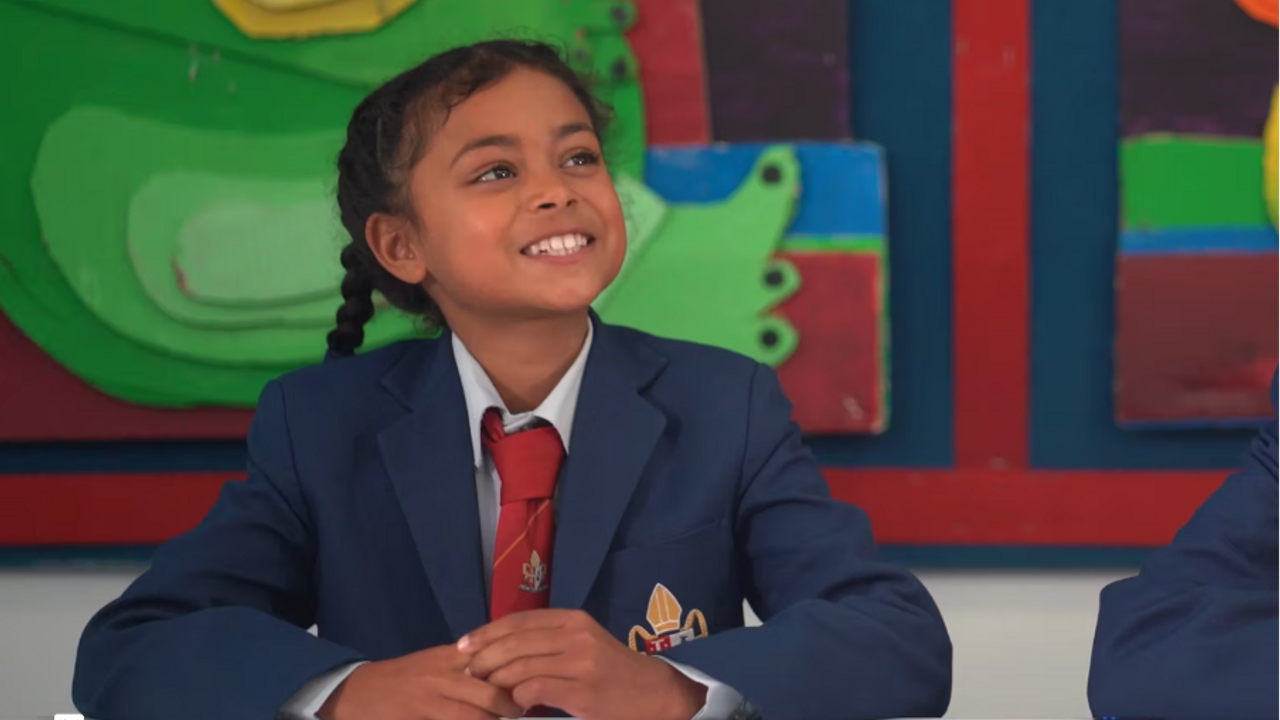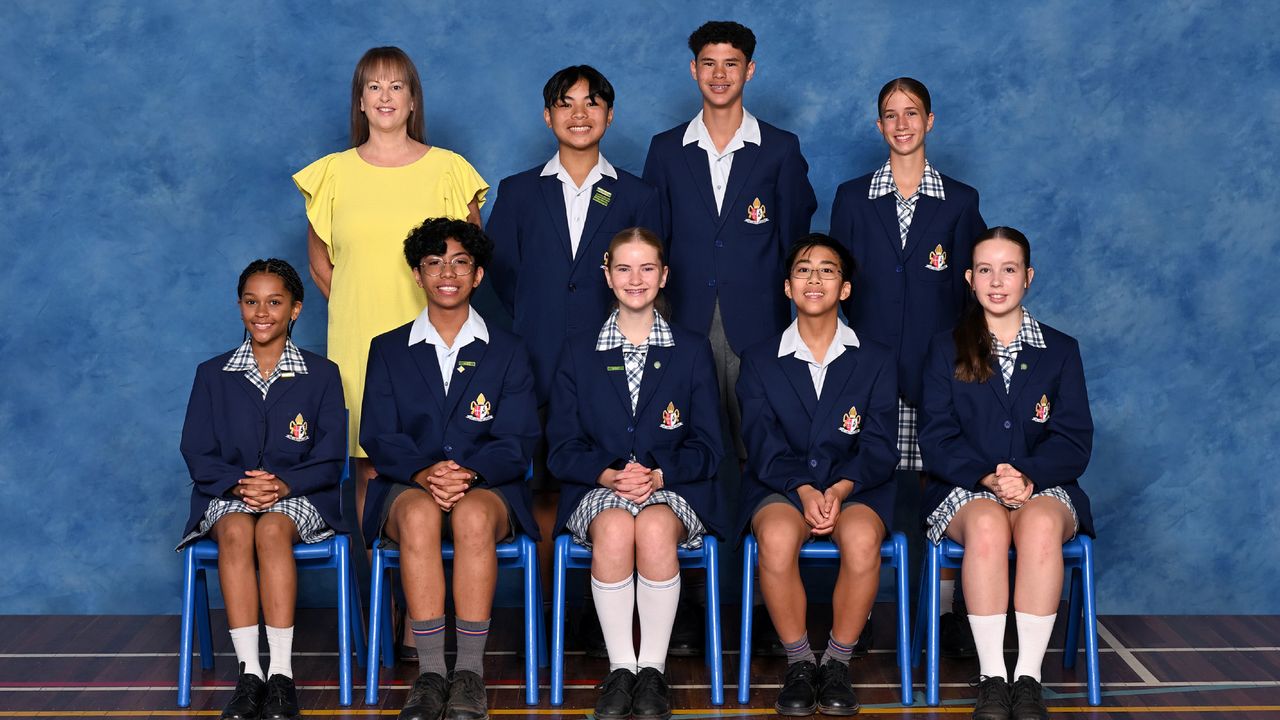Middle School (Years 5-8)
Discover and Grow
An authentic, rich, and challenging academic program where students can explore, learn, make friends, discover their passions, and be inspired to be their best.
Our Middle School is located at the Yirramboi Campus, Keilor, and is a vibrant learning community that supports students from Years 5 - 8 through their academic and personal growth. With a focus on guiding students as they transition from childhood through to adolescence, the curriculum is innovative and engaging, set within a supportive environment.
Experienced educators with a deep understanding of early adolescence, work closely with students to help support their academic and personal growth. They foster strong partnerships to ensure students are guided through key developmental transitions whilst feeling valued and supported. In addition, exposure to an extensive range of co curricular opportunities supports students to discover their passions and shine.
What Our Students Say
Click the image below to hear from our Middle School students as they share, in their own words, what makes their Overnewton experience so special.
The Middle School Experience

Transition to Middle School
At Overnewton, we recognise the transition to Middle School as a key milestone. Our programs are designed to make this step smooth and supportive.
We focus on:
- Understanding each student’s interests and strengths
- Addressing learning challenges
- Offering engaging and challenging learning programs
- Building strong relationships with students and parents
- Collaborating on personalised learning pathways
Our goal is to create a safe, supportive space where students feel a sense of belonging, can make friends, and are challenged. Our teachers guide students in navigating emotions, building resilience and personal growth, while monitoring both academic and wellbeing needs.
Middle School Brochure
Pastoral Care
Middle School is a time of significant developmental change for students; socially, emotionally, and cognitively. Evidence shows that students with strong relationships at school are more engaged, motivated, and achieve better academic outcomes. That’s why pastoral care and wellbeing are central to everything we do at Overnewton.
In a supportive and inclusive environment, students develop skills for emotional regulation, resilience, and self-motivation - skills essential for learning and life. Class Agreements are co-created based on our College Values and Fundamental Five, fostering shared expectations, responsibility, and a strong sense of belonging.
Our approach is underpinned by the Victorian Government's Rights, Resilience and Respectful Relationships Program curriculum, which explicitly teaches emotional literacy, respectful communication, and positive relationships. These capabilities are embedded in daily practice and supported by our Restorative Practices framework, which builds empathy, accountability, and trust across the school community.
By prioritising connection, care, and character development, we ensure that every student feels seen, supported, and empowered during this critical stage of their growth.
Curriculum
The Middle School curriculum draws from the Australian Curriculum and builds breadth and depth of knowledge across subjects, providing a solid foundation for academic success and personal growth.
Core Subjects
- English
- Mathematics
- Science
- Humanities
- Religion and Values Education (RaVE)
Specialist Subjects
Taught by specialist teachers, these subjects offer a diverse range of learning experiences and enable students to continue to develop their skills across these learning areas:
- Health and Physical Education
- Mandarin Language Literacy (Years 5 & 6)
- CLIL Mandarin (German becomes available from Year 7)
- CLIL Mandarin Content areas: Geography at Year 5, Geography & World Indigenous Studies at Year 6, and Mathematics at Year 7 & 8 (by invitation only)
- Sport - Year 5 & 6 School Sport Victoria (SSV) weekly interschool sport, and Year 7 & 8 Association of Co-Educational Schools (ACS) competition
- Visual Arts
- Technology
- Performing Arts, including our Band Program (Year 6) and Drama, Dance, Music Performance and Music Technology (all begin at Year 7)
Students are encouraged to pursue their interests and passions, and use the opportunities provided to extend their learning and try new things.
Electives Program
Year 8 students are offered a range of subjects drawn from the learning areas of Performing Arts, Technologies and Visual Arts.
These subjects offer a diverse range of learning experiences and enable students to continue to develop their skills across the three learning areas. Students are encouraged to both pursue their interests and passions, and use the opportunities provided to extend their learning and try new things.
Students study two subjects per semester, with a total of four subjects across the year. Students must study one subject from each of the learning areas of Performing Arts, Technologies and Visual Arts. The fourth subject is a free choice from all the electives on offer.
Year 7 Languages Information Booklet
Year 8 Electives Program Brochure
Student Leadership
Middle School leadership, both formal and informal, allows students to make a positive impact. As leaders, students aim to be responsible, fair, positive, and caring, advocating for their peers and fostering an inclusive school environment.
Leadership enhances skills, character, and respect for diverse communities locally, nationally, and globally.
Middle School Captains, Vice Captains, Student Representative Council Leaders, and House Captains are selected each year from the Year 7 cohort in Semester 2. They receive support from the Head of Middle School, Deputy Head of Middle School, Year 8 Level Leader, House Coordinators, and Head of Synergy.
Co Curriculum
Co Curricular Programs in Middle School are an important part of each student’s journey as they build relationships with peers and staff, develop their passions, and discover new interests beyond the walls of the classroom.
Activate
Activate allows students to participate, develop, and perform in various sports. They can develop leadership skills through team captaincy, improve athletic abilities, take pride in their achievements, and demonstrate sportsmanship. In Years 5 and 6, students compete weekly in an interschool sporting program under School Sport Victoria (SSV). Competitions are available at district, zone, regional, and national levels. In Years 7 and 8, students participate in a seasonal weekly interschool program through the Association of Co-Educational Schools (ACS), with opportunities to compete in swimming, cross country, and athletics carnivals, alongside other sports like chess and cheerleading.
Be Heard
Debating develops critical thinking, public speaking, and argumentation skills. Students can participate in Middle School House Debating, the Debaters Association of Victoria (DAV) for Years 8–12, and British Parliamentary Debating for Years 7–9. In addition, students across various year levels have the opportunity to enter public speaking competitions such as Rostrum Voice of Youth, DAV Junior Public Speaking competition for Years 7–8, ACS Public Speaking, and the Legacy Public Speaking competition.
Instrumental Music
Students also have access to a comprehensive Music Program from Prep to Year 12, with expert tuition in various instruments, and opportunities to perform in instrumental groups, choirs, and music ensembles. Performance examinations, including AMEB and ANZCA, are available for students seeking further development.
Performing Arts
Students are provided with opportunities to develop and express their ideas through the Performing Arts Co Curriculum. Each event offers a live audience, allowing students to build teamwork, self-esteem, and self-worth. They are encouraged to explore their creative and artistic talents by participating in our extensive dance and drama programs, including the Year 5/6 Musical, the College Musical (Years 7–12) and the 'Battle of the Houses' competition.
Synergy
Overnewton fosters influential students who grow as individuals and leaders, guided by Christian values of service and social justice. We aim to create ethical, compassionate thinkers who take action. Student voice, agency, and leadership are central to the Synergy Pillar, with our service-learning model offering hands-on experiences and personal reflection. Middle School students can participate in groups such as the Student Representative Council, Sustainability Team and RAP Committee.
House
Led by House Coordinators and Year 8 House Leaders, the Middle School House Programs foster teamwork, leadership, and cross-age connections. Through clubs, activities, and events, students engage with peers and teachers while stepping out of their comfort zones. Opportunities include Swimming, Cross Country, Athletics, Lunchtime Round Robins, Battle of the Houses, Debating, Public Speaking, and Community Service.
Discover more about our exciting range of programs and activities
Camps
The Middle School Camp Program builds on students’ leadership and outdoor education knowledge and skills through camping, bushwalking, water-based activities, and team challenges. All students from Years 5 - 8 must attend one camp each year.
Students gain experiences from a variety of outdoor activities in natural environments, in contrast to their everyday living environments. Age-appropriate experiences are designed and delivered in a positive and supportive way, and students may be challenged physically and emotionally.
Camps in Middle School provide transitional pathways into the Years 9 -12 Outdoor Education programs.
We acknowledge and pay respect to the Marin Balluk people of the Kulin Nation, the Traditional Custodians of the Land on which Overnewton Anglican Community College stands. We respect the knowledge that will be forever embedded within the Aboriginal Custodianship of Country and remember the loss of cultures, languages and Lands they have endured. Like the Marin Balluk people, we at Overnewton want to respect the Land, the cultures and the heritages, and learn from those who have come before us in the passing on of knowledge and the teaching of life skills, as well as continue with wise stewardship of our buildings and grounds. We honour their custodianship of this Land and offer them our deep respect.


